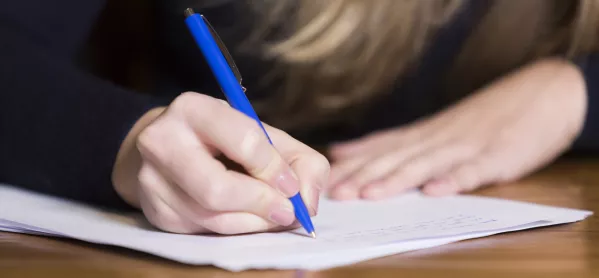
- Home
- Sats pressure ‘begins in nursery’
Sats pressure ‘begins in nursery’

Sats preparation begins “as soon as the three-year-olds step through the door”, according to a new survey of almost 300 headteachers.
The UCL study, released today, also reveals that almost three in four primary school heads (74 per cent) admit they “teach to the test”, while 90 per cent believe the curriculum is narrowed in Year 6 as pupils are prepped for exams.
Dr Alice Bradbury, from the UCL Institute of Education, surveyed 288 heads for her report Pressure, anxiety and collateral damage: the headteachers’ verdict on Sats - and concluded that the tests are indicative of a “system with the wrong priorities”.
Analysis: Sats: Girls widen gender gap over boys in 3Rs
Viewpoint: The wait-and-see game over key stage 2 Sats results
Exclusive: Could you do the Sats question that made pupils cry?
The survey was distributed via the NEU teaching union and social media. More than half (52 per cent) of heads said they believe the tests also narrow the curriculum earlier in the school.
One headteacher commented that “preparation starts as soon as the three-year-olds step through the door”.
Another headteacher added: “We’re really aware now that the work starts right from the moment they enter the school in nursery.”
According to another head, the teaching framework is “strait-jacketed by the need to prepare the children for the tests”, with a fourth adding: “For those children in Year 6 this year, and last year, it’s intense, it’s grotty. It’s just reading, writing, maths, pretty much and I wouldn’t choose that for any child.”
Sats ‘put pressure on teachers’
Meanwhile, 99 per cent of headteachers agreed that Sats put pressure on teachers, and 83 per cent said they have a negative effect on pupils’ wellbeing.
“They think they are a failure if they don’t pass no matter what we say to them,” one headteacher said.
There was also concern that the pressure created a bias in the allocation of resources, with one head admitting: “Oh, without a doubt, the strongest teachers have to go into Year 6 […] because it’s such a high-stakes accountability measure. Everything depends on it because if we get bad Sats results, then that triggers an Ofsted.”
2016 changes to KS2 Sats
The survey also found that 91 per cent of headteachers felt the changes to the KS2 tests in 2016 did not improve the assessment.
“The standards expected have put more children in danger of failure,” one head said.
Dr Bradbury concluded: “Headteachers’ views of Sats are, in the majority, negative: as one headteacher put it, ‘I don’t think you’ll get many heads that say they like the Sats.’ However, the system is so well established that many also find it difficult to envisage a system without Sats.
“Overall, the findings suggest that Sats continue to be a controversial measure of schools’ effectiveness, with negative effects on children, teachers and the curriculum and pedagogy.”
Sara Tomlinson, from campaign group More Than A Score, said: “The stakes around primary assessment are so high that the negative effects are inevitable.
“It’s wrong to test 10- and 11-year-olds under exam conditions and it’s unjust to use those results to measure a school’s performance as a whole.
“It’s time for the government to listen to those who know children and schools best and put an end to this broken system.”
A spokesperson for the Department for Education said: “Sats should not be stressful for pupils - and there is absolutely no need for teachers to be preparing young children for them. All over the world, schools guide children through assessments without them feeling pressured. This is how it should be.
“Ofsted’s new inspection framework focuses on ensuring schools are offering a broad, balanced and sequenced curriculum so that pupils build their knowledge and skills over time rather than through excessive exam preparation.”
This year, 65 per cent of pupils reached the expected standard in reading, writing and maths in the KS2 Sats.
School standards minister Nick Gibb said at the time that the tests were changed in 2016 to make sure they assessed schools’ performance in equipping pupils to understand the new, improved primary curriculum.
And he has said previously that the government trusts schools not to put “undue pressure” on pupils when administering the assessments.
Register with Tes and you can read five free articles every month, plus you'll have access to our range of award-winning newsletters.
Keep reading for just £4.90 per month
You've reached your limit of free articles this month. Subscribe for £4.90 per month for three months and get:
- Unlimited access to all Tes magazine content
- Exclusive subscriber-only stories
- Award-winning email newsletters
You've reached your limit of free articles this month. Subscribe for £4.90 per month for three months and get:
- Unlimited access to all Tes magazine content
- Exclusive subscriber-only stories
- Award-winning email newsletters



